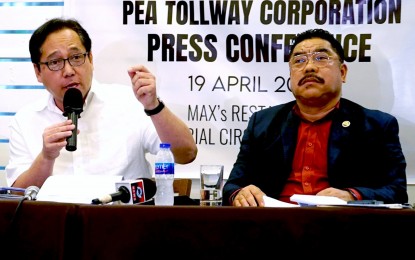
GOV’T PROPERTY. Public Estates Authority Tollways Corp. (PEATC) spokesperson Ariel Inton (left) and PEATC President and Officer in Charge Steve Esteban urge for the turnover of the operations and maintenance of the Manila-Cavite Expressway from the Cavitex Infrastructure Co. to the government, during a press conference at the Quezon City Memorial Circle on Friday (April 19, 2024). The PEATC officials maintained that Cavitex is owned by the Philippine government. (PNA photo by Ben Briones)
MANILA – The Public Estates Authority Tollways Corp. (PEATC) on Friday demanded the turnover of the operations and maintenance (O&M) of the Manila-Cavite Expressway (Cavitex) from the Cavitex Infrastructure Co. (CIC).
In a press conference in Quezon City, PEATC President and Officer in Charge (OIC) Steve Esteban said the operations and maintenance agreement (OMA) that gave CIC the O&M responsibility of Cavitex ended on Aug. 25, 2021, based on Philippine Reclamation Authority (PRA) Board Resolution 5383.
Esteban said the O&M of Cavitex should have been turned over to PEATC – a government-owned and -controlled corporation created by the PRA for tollways management – beginning Jan. 1, 2022.
“Patuloy ang pag-uusap ng PRA at CIC, pero ang kagustuhan ng CIC ay sila ang masusunod (The PRA continues to discuss this with the CIC, but the latter insists that they should be the one in charge),” he said.
From the current 90 percent to 10 percent revenue-sharing in favor of CIC, he said Cavitex revenue-sharing would change to 60 percent to 40 percent in favor of the government once the O&M returns to PEATC.
He noted that a toll decrease on Cavitex is possible once the O&M of Cavitex is returned to the government.
“A writ of mandamus is the first step towards that direction. We need that to calculate how much we should be charging for,” Esteban said.
Case filed at Court of Appeals
In February, a writ of mandamus was filed before the Court of Appeals (CA) due to the CIC’s refusal to turn over Cavitex.
Esteban emphasized that the case is not a dispute, but is a request for help from the CA for the proper turnover of the project, and thereby not part of any arbitration agreement.
“Bakit sinasabing walang dispute? Kasi ang mandamus, it means ministerial duty. Meron duty itong taong ito na hindi niya ginagawa (Why are we saying there is no dispute? Because mandamus is about ministerial duty. This person has a duty that they’re neglecting). They should comply,” he said.
He added that the Commission on Audit (COA) has sent the PEATC multiple audit observation memos due to their failure to take control of Cavitex, noting that the CIC is immune from the same government oversight as a private company.
“Walang kontrol ang gobyerno sa budget nila. So hindi sila pwede i-audit ng COA (The government has no control over CIC’s budget. That’s why COA can’t audit them),” Esteban pointed out.
‘Rampant corruption’
In addition to CIC’s refusal to turn over Cavitex, Esteban alleged that he witnessed “rampant corruption” in CIC’s operations through the existence of tollbooths with no point-of-sale (POS) machines.
These toll booths, he said, still receive payment from expressway users despite not recording these transactions in their system, and thus are untaxed revenue.
During the press conference, representatives of the Cavitex security workers union and the PEA Tollways Union (PEATEU) – workers who provide security and manpower on Cavitex tollbooths – also alleged that the CIC has disallowed wage increases for the past decade and refused to provide adequate equipment.
These union representatives said that computer systems used in toll collection have been left with broken air conditioners (AC), resulting in system failures and hassle to toll users, in addition to letting employees use old and dilapidated vehicles and other equipment.
Government property
Lawyer Sylvester Golez, legal manager of the PEATC, said that Cavitex, both the land reclaimed by the PRA and the original road built on this land, is owned by the Philippine government.
“Why did the CIC come into the picture? Their source of rights is the OMA. And this was already expired in 2021. There have been transition committees but what happened here?” Golez said.
Once the O&M of Cavitex is back in the hands of PEATC, he said proper government oversight would be possible.
“Since this is government property, karapat-dapat lang na malaman ng buong bayan ang nangyayari sa Cavitex (the entire nation should know what is going on in Cavitex),” he said.
No technical ability to handle tollways
PEATC spokesperson Ariel Inton also responded to allegations made by Metro Pacific Tollways Corp. (MPTC), the parent corporation of CIC, that the government has no “technical ability” to run Cavitex.
However, he said that the workers inside Cavitex tollbooths are already government personnel.
He rebuked the offer of MPTC to purchase the 10 percent revenue share of the government in Cavitex for about PHP2 billion.
“In one year, kumikita sila ng PHP2 billion (from Cavitex). Sino ang papayag sa ganung offer (In one year, they earn about PHP2 billion from Cavitex. Who would accept such an offer)? It is too unconscionable,” he said.
Inton said that turning over the O&M of Cavitex to PEATC would result in higher earnings for the government.
The PEATC, formerly the Public Estates Authority, was incorporated on Oct. 7, 1997, to take over and perform the duties and obligations of the PRA under the toll operations agreement signed by the PRA, Toll Regulatory Board, and the UEM-MARA Philippines Corp. (UMPC) on July 26, 1996.
Under the terms of agreement, UMPC, now CIC, has the primary and exclusive privilege, responsibility, and obligation to design, construct, and finance the project while the PRA has also the primary and exclusive privilege, responsibility, and obligation to operate and maintain and to collect toll fees. (PNA)
